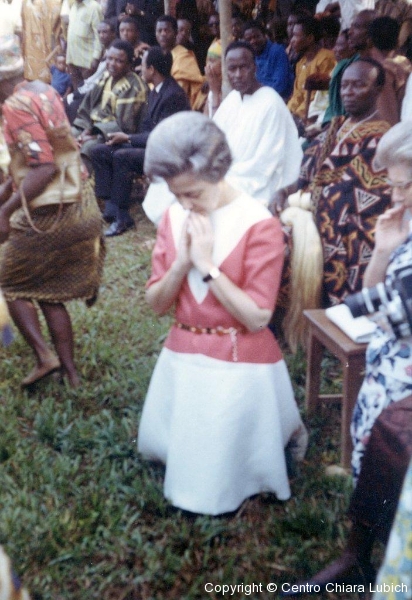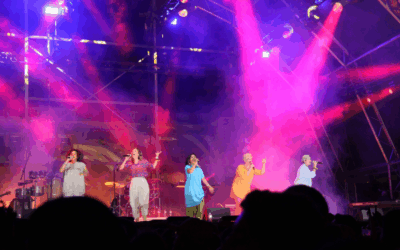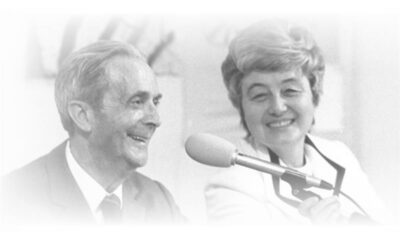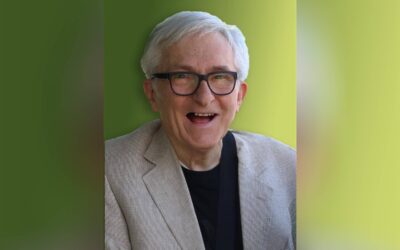«The small town of Fontem in Cameroon deserves to be mentioned today. Its name could truly be this: “You did it to me.” It’s like a fairy-tale story. In the bush of the Cameroon there lived a people who were once very numerous. Almost all of them were pagans, but very dignified, morally sound and rich in human values. We could say that they were a naturally Christian people. They belonged to the Bangwa tribe, but the population had been decimated by sickness. In fact, ninety-eight percent of the children were dying in their first year of life.
Not knowing what to do, those Africans, with a few Christians who were among them, asked themselves: “Why has God abandoned us?” Then they acknowledged: “Because we don’t pray.” And so, all together, they decided: “Let’s pray for a year; who knows, maybe God will remember us!”
They prayed, day after day, with only one thought in mind: “Ask and you will receive; knock and it will be opened to you.”(Mt 7,7). They prayed the whole year long. At the end of the year, however, nothing had happened.

Fontem, 19 January 1969. Chiara prays during the Mass celebrated for the inauguration of the hospital “Mary Health of Africa”
Without becoming discouraged, the few Christians said to the people: “God didn’t answer us because we haven’t prayed enough. Let’s pray for another year!” And so they prayed for another year, the whole year long. The second year passed and still nothing happened. They met again and asked themselves: “Why has God abandoned us? Because our prayers don’t have any value in the eyes of God. We are too bad. Let’s collect some money; we’ll send it to the Bishop who can ask a more worthy tribe to pray, so that God will have pity on us.”
The Bishop was touched by this and began to take an interest. He went to them and promised a hospital. Three more years passed but there was no hospital. At a certain point, focolarini doctors arrived, and the Bangwa people saw this as the answer of God. The focolarini were called ‘the men of God.’
The focolarini understood that in this place what mattered was not to speak. They could not say in those circumstances: “I wish you well, keep yourselves warm and eat plenty” (Jas 2:16).They said: Here we need to roll up our sleeves and get down to work. And they set up a dispensary in the midst of unspeakable hardships.
I went there three years later. That large crowd of people gathered in a vast open space in front of the living quarters of their king, the Fon, appeared to me as being so united and eager to be dignified, that they seemed to me as a people long prepared by Mary for Christianity in its most integral and genuine form. Even then, the village was already unrecognizable. Not only because of the works, roads and houses that had been built, but also because of the people themselves.
The previous work of the missionaries, who could visit the region only rarely, had already laid very solid foundations. Small nuclei of Christians had already risen up here and there, like a seed waiting to develop. But now the movement towards Christianity had assumed the proportions of an avalanche. Although the priests effected a rigorous selection, every month they baptized hundreds of adults. A government inspector who had made the rounds of the zone to inspect the elementary schools, declared: “All the people are strongly oriented towards Christianity because they have seen how the focolarini live it in a concrete way.”
And we must say that the work of evangelization carried out by the focolarini during those three years was almost exclusively based on witness. There was a lot of work to do, indeed, almost only work, and under the most difficult conditions: because of the inadequate means and ability of local workers, and the rough roads and difficulty in receiving supplies. So there were no regular meetings, no large day-meetings, no public talks. Just a few private talks in casual encounters. And yet, every Sunday, the tent-like church became increasingly crowded. Together with the group that was already Christian, there was an ever-growing number of Animists who wanted to know more about Christianity. Now the church was overflowing, with more people outside than the packed crowds inside. Thousands of people assisted at Mass, several hundreds received Communion.
Fontem was a unique experience for us. It seemed that we were re-living the development of the early Church when Christianity was accepted by all in its wholeness, without limitations and compromises. And the experience of Fontem already began to interest other African communities, like that of Guinea, Rwanda, Uganda and Kinshasa in Zaire[1],, so that Fontem increasingly assumed its role as a pilot center for the surging of a characteristic evangelization. Now Fontem is already a large town, with all the essential aspects of a town. And it is also a parish.The focolarini became credible because they did to Jesus what they did to the Bangwa, giving the witness of love first of all among themselves and then with all the people.»
Chiara Lubich
Excerpt taken from a talk at the meeting of the Men Religious Movement at Castel Gandolfo, April 19, 1995
_________________________________
[1] Current Democratic Republic of Congo.






0 Comments